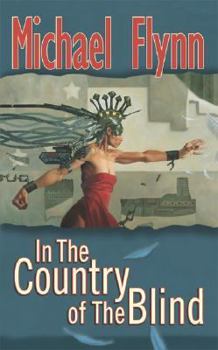In the Country of the Blind
Select Format
Select Condition 
Book Overview
Customer Reviews
Rated 5 starsAsimov's Second Foundation on the Net
I love conspiracy and alternative history books. Here we have a secret society like Asimov's Second Foundation moving in a net-connected Earth (like our own). This book is all "Cryptonomicon" wanted to be.It's all on the uncanny coincidences and turning points of history, on how tiny little changes make momentous differences in the long term, as predicted by chaos theory...and humanity caught in history whirlwind. Recommended...
1Report
Rated 5 starsBetween Generas
Michael Flynn is one of the people (along with Lois McMaster Bujold and Spider Robinson) that I consider the sucessor to Robert A. Heinlein (and yes, it takes at least three people to fill Heinlein's shoes). I was very glad to see that his first novel, In the Country of the Blind, was going to be back in print (will his short story collection, Werehouse, be following I hope I hope I hope).This novel never got the respect...
0Report
Rated 4 starsA terrific "thinking man's" novel . . .
One of the usually less successful types of science fiction story (in my opinion) is the "secret history" story, in which the plot turns on events that most of us don't know about -- things we aren't *supposed* to know about, secret things that allow some individual or group to (usually) rule the world. Generally, the key events or relationships that give the secret group its power are a little too pat, a little too coincidental,...
0Report
Rated 5 starsThe Best Science Fiction Book Which Cannot Be Bought
I am currently re-re-re-reading "In the Country of the Blind" (which was published in the early 90s) and it impresses me yet again.The subject is the construction of Babbage's difference engine in the mid-1800s, and the existence of "societies" which develop the science of forecasting a full century in advance of what has happened in (our) timeline. The development of the book is brilliant and as complex as the subject...
0Report















